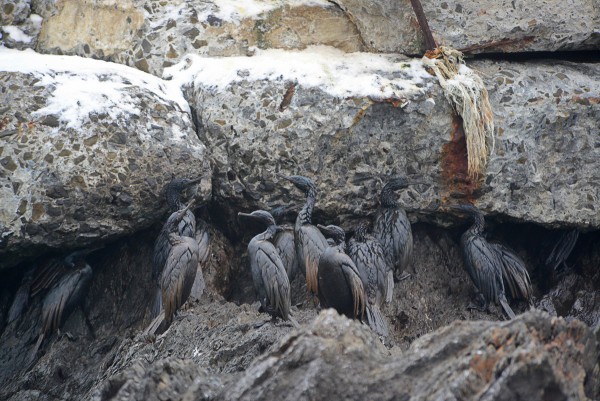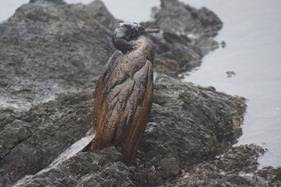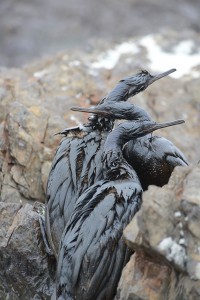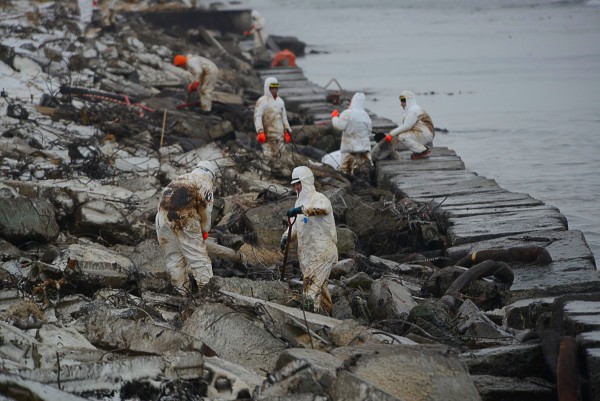A Russian tanker carrying 200,000 gallons of oil ran aground off an island in the North Pacific over the weekend. As it continues to leak, it resurrects a debate on how safety can be improved in a region where a major wildlife corridor overlaps with a busy shipping through-point.
The tanker struck a reef off the island of Sakhalin during a storm, according to The Siberian Times.

The vessel been stuck on that reef since Saturday, leaking oil into the surrounding area. The region’s governor has called it an “ecological disaster.”

Pictures of an oiled shoreline quickly surfaced online, leading many to worry about the far-reaching effects of the spill.
Melanie Smith with Audubon Alaska says along with contaminating the local wildlife, some Alaska species may be affected as well.
“There’s a very large sea lion rookery there and several globally significant bird areas are in the region and a number of Alaskan species use those IBAs — important bird areas. So we’re not sure whether individual birds that travel between Sakhalin and Alaska are being affected, but we do know that a number of Alaskan species are present in that area, which is part of our concern.”
Audubon Alaska has been working with the Coast Guard to prevent accidents like this one from happening in American waters. Along with designating a specific shipping route for the Bering Strait, Smith says Audubon’s top priority has been to designate areas to be avoided.

“And that’s a technical term that designates a place off limits to ships other than those that are accessing local communities. So aside from local traffic, large vessels would avoid those areas whenever they need to deviate from the route that the coast guard identified.”
The Bering Strait not only serves as a choke-point for vessel traffic, but also as one of the world’s most active migratory corridors, which in turn helps feed the region’s Native communities.
“So you have hundreds of thousands of mammals, about 12 million birds nesting in the region, and really important cultural subsistence areas around all of those communities. So those areas to be avoided that we’ve identified, there are four of them, and they would protect those ecological and cultural values.”
Despite those efforts, a spill in the Bering Strait would still be hard to respond to.
The Russian tanker that ran aground in the North Pacific was less than 500 feet from a port that has access to clean-up equipment. But, those efforts were stalled due harsh weather.
Elena Agarkova is the senior shipping officer at the Worldwide Wildlife Fund’s Arctic Program, says this incident should encourage more infrastructure development.
“In the Bering Strait, you know the northern Bering region, we don’t have that kind of response infrastructure, so even if the weather cooperates, it will take a much longer time for any response vessel to reach the potential oil spill location. It’ll be even more difficult for U.S. or Russian forces to respond to an incident like that in the Bering Strait.”
And that brings up the final hurdle to ensuring safe shipping through the strait: cooperation between the U.S. and Russia. Agarkova says the WWF has been advocating for more bilateral cooperation.
“We’ve been urging the Coast Guard to resume their cooperation with Russia on oil spill preparedness and response including holding actual exercises in the Bering Strait. They were supposed to do those a couple years ago and they were postponed. And because the current political situation its been a challenge to get that process going again.”
While cooperation may be a long way off, many on both sides of the strait are hoping the North Pacific storm will soon pass. Meanwhile, oil continues to leak into surrounding waters.
An earlier version of this story implied oil was leaking into the Bering Strait. Oil is leaking into the North Pacific. We regret the error.
Emily Russell is the voice of Alaska morning news as Alaska Public Media’s Morning News Host and Producer.
Originally from the Adirondacks in upstate New York, Emily moved to Alaska in 2012. She skied her way through three winters in Fairbanks, earning her Master’s degree in Northern Studies from UAF.
Emily’s career in radio started in Nome in 2015, reporting for KNOM on everything from subsistence whale harvests to housing shortages in Native villages. She then worked for KCAW in Sitka, finally seeing what all the fuss with Southeast, Alaska was all about.
Back on the road system, Emily is looking forward to driving her Subaru around the region to hike, hunt, fish and pick as many berries as possible. When she’s not talking into the mic in the morning, Emily can be found reporting from the peaks above Anchorage to the rivers around Southcentral.





